Subscribe to ‘Words Of Hope’
Get our emails direct to your Inbox with updates about all our campaigns, trips and events.
Earlier this year, Amos Director Chris Rose visited our partner uMthombo in Durban, South Africa. It was an opportunity to connect with the uMthombo team after a long time due to the pandemic restrictions and to witness the work of their frontline staff as they journey with young people living on the streets of Durban. Here are some of his reflections on that visit.
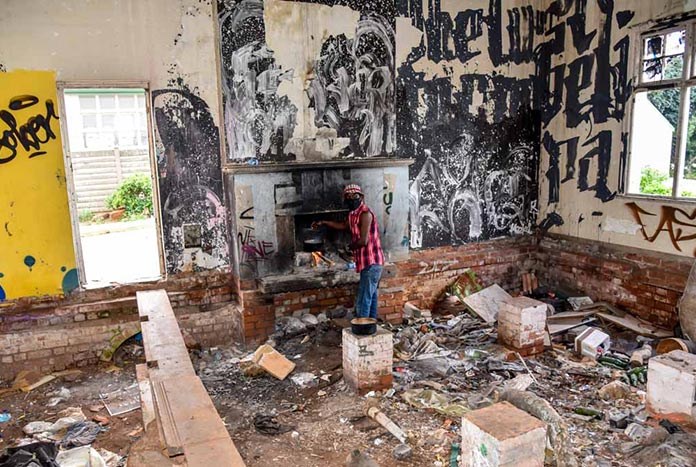
“Street-Connected”: Many young people living on Durban’s streets actually take shelter in abandoned buildings across the city
— — — — — — —
Street-connected
“Kunjani.” The young man opposite me reaches into his pocket and pulls out a small crumpled piece of silver foil.
The newcomer sits down, finding a spot in the shade to avoid the early morning sun. He places a cigarette beside him, then carefully splits the foil in two – he heats both sides of one piece with his lighter, lights a cigarette, has a drag and then wraps the other piece around its end to stop it from burning down.
He takes his wonga (the size of a grain of rice), breaks it in half and places half on the first piece of foil. He puts a short plastic straw in his mouth, covers his head and shoulders in a plastic sack, and heats the underside of the foil, making sure to draw in all the smoke. Then he reaches over, unwraps his cigarette and takes a drag to ‘down it’ (Bohlisa) deep into his lungs before carefully stubbing out the cigarette to save it for later.
To score wonga costs about 16-20 rand, less than £1. Users may get through three or four fixes in a day. Fifteen years ago, every child on the streets sniffed glue. But it’s 60 rand a bottle, and the high is not nearly as strong as the opium-based wonga. Glue is also not nearly as addictive. The use of wonga has spread among young people whose lives revolve around the street and many of those in the surrounding townships.
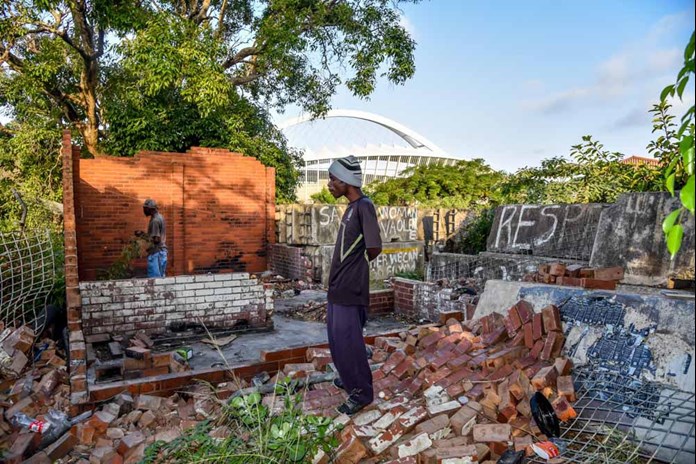
Unsafe havens: A young man surveys his current home, in the shadow of Durban’s grand sports stadium in the background
— — — — — — —
Today, alongside the uMthombo team, we meet around 90 young people, aged between 16-35, (the category for young adults in South Africa), with at least 75% addicted to wonga. We meet them sleeping in doorways or under intersections or hanging out in abandoned buildings across the city.
When I first came to Durban 15 years ago, large groups of children and young people lived on the streets — they represented the classic image of street children. However, following a long campaign led by uMthombo to change how these children were seen and treated, and their involvement, alongside other projects, in helping shape the second iteration of the South African Children’s Act, there has been a significant change.
Today we met young people sleeping in doorways, under intersections or in abandoned buildings across nine locations.
One of the recommendations in that Act was a grant scheme pioneered in Brazil for families whose children attended school. In South Africa it's known as the Child Support Grant and its implementation has made it possible for desperately low-income families to be able to feed their children and for others to afford to keep them at home and in school - giving enough of an incentive to those who may have previously kicked children out of the home. As a result, the age of those on the streets has increased significantly.
It now tends to be young people who have:
The term used by many child rights professionals to describe children who live on the streets, or whose lives revolve around the streets, is ‘street-connected’. While it’s not a term we always like to use (as it is so broad), it accurately describes the relationship these young people have with the streets. There is a ‘connection’ that can be very hard to break, especially if a young person has been there for any length of time.
There can be a level of excitement on the streets and when this is combined with narcotics or alcohol, it starts to drown out the fear and trauma that haunts the streets, as well as the trauma many have experienced at home that drove them to the streets in the first place. As they try to break this connection and leave street life, this trauma can hit them head-on. Wonga massively reinforces this. Giving it up is desperately hard, and on the streets you can easily earn enough by washing taxis, begging at robots (traffic lights) or selling plastic, to score enough to stagger blankly through a day.
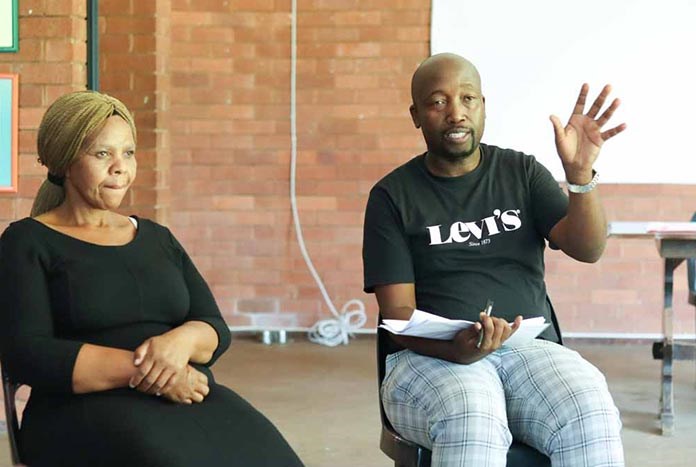
uMthombo’s team: Hloniphile and Lindelani deliver a session with young people still living on the streets, building trust and getting to know them
— — — — — — —
uMthombo’s work focuses on enabling young people to break this connection with the street and prevent others in the surrounding townships from going down the same path. uMthombo recognised, that as substance misuse has grown and swept through townships, there was a shift away from the streets in Durban as younger children were becoming more and more drawn into the street life in their local area. This is why they now run preventative work in communities, partnering with schools and other groups to run preventative programmes. The simple aim of this work is to connect with young people before they become street-connected.
There can be a level of excitement on the streets and when this is combined with narcotics or alcohol, it starts to drown out the fear and trauma that haunts the streets, as well as the trauma many have experienced at home that drove them to the streets in the first place.
uMthombo’s work with those on the streets in Durban is rooted in outreach. They visit different areas of the city at least three times a week, where young people live on the streets or in abandoned buildings. This way, they build relationships and gradually offer opportunities for the young people to become involved in their programmes. For young men it’s their Post-16 Programme, and for young women, their Young Women’s Programme.
The Post-16 Programme
Coming off wonga is hard. A common first question the young people in the park ask the uMthombo team, is, do they offer a natural detox or a chemical one? Natural detox — ‘cold turkey’ — comes with the shakes, cramps, acute stomach pains, diarrhoea, no appetite, high temperatures and the sweats. The chemical detox dulls this and is used in some residential centres, but it is inappropriate for uMthombo’s Programme.
At the start of the Programme, uMthombo supports the young people through a natural and then medical detox to flush the poisons out of their system. They then spend three months living in a remote rural house with up to 10 other young men, all on the same journey of learning how to live without drugs.
They learn how to:
Coming off wonga is hard. A common first question the young people in the park ask the uMthombo team, is, do they offer a natural detox or a chemical one?
After the first few weeks, the young men return to their homes or extended family members for the weekend. Crucially uMthombo works alongside their families at this significant time to create a stable location for the young men as they finish the Programme. Often the young men will have destroyed any trust with their family and local community by stealing from them, and uMthombo’s process addresses this and creates a new basis on which they can live together.
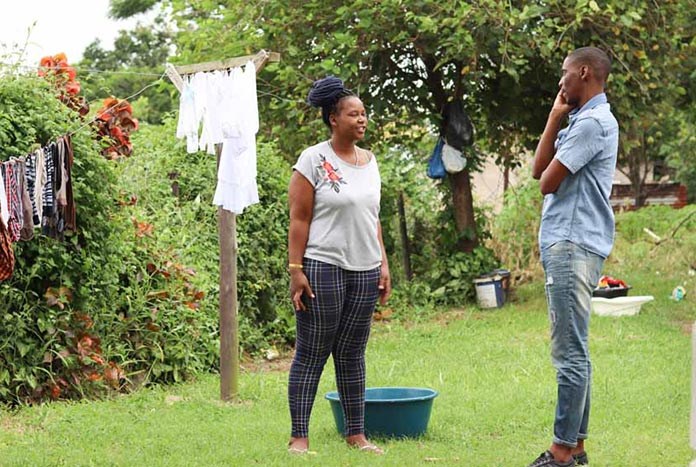
Support on the journey: The uMthombo team meet with young women regularly to support them as they get used to life in their own home
— — — — — — —
The Programme acknowledges that reintegration will not prevent young people from coming across those who would look to get them using again or that they will not want to use again and that the craving may be very powerful. But it recognises that by helping them move from the street, they will not be surrounded by it and by the fear which drives many to use drugs.
The Programme aims to create in the young people (with the support of their extended family), the resources needed to stay clean and to start looking for work while being very much aware of how difficult this is — South Africa currently has a 35% unemployment rate, and a youth unemployment rate of 42% rising to over 60% for those under 24.
The success of the Post-16 and Young Women's programmes and the number of referrals to them, is built on uMthombo’s extensive outreach to different organisations and communities across the eThekwini municipal area. These organisations join together in the preventative work by signposting young people (or their parents) to uMthombo’s programmes. The young people then self-refer, or their parents may do so on their behalf. This collaborative work across organisations has created a strong support base for their reintegration work.
A first step for many will be to attend an uMthombo open day where the uMthombo team will be available to listen to the young people and parents, together and separately. They will talk about the Programme, how hard parts of it will be, and how it works. Former Post- 16 Programme members will also be there to talk to them about the journey they are looking to begin and introduce them to the people who will support them along the way. uMthombo will also carry out substance tests with the young people, so they know the drugs they are using and can plan their detox programme.
The success of the Post-16 and Young Women's programmes and the number of referrals to them, is built on uMthombo’s extensive outreach to different organisations and communities across the eThekwini municipal area.
uMthombo’s support for young people takes them all the way through to joining internships and getting into employment. This year, 39 young people from the Post 16’s Programme were placed in the Urban Improvement Precinct (UIP) internship programme. In total, 67 young people have been through a two-year internship, including some participating in uMthombo’s community engagement programmes. Others have been offered better-paid work or have left the Programme. These 54 are now employed in various city departments, receiving group and individual support from Umthombo.
Young Women’s Programme
uMthombo’s Young Women’s Programme is similarly built around outreach, meeting girls on the streets. The focus is to develop trusting relationships with them, address their low self-confidence and low self-esteem, enable them to see their own agency, (how they can change their lives), and identify with them the steps they can take to transform their lives.
They understand that central to this process of coming off the streets for many young women, many of whom are themselves mothers, is to have affordable accommodation. And when the time is right, they can be supported to make that move. Once a young woman takes this step, uMthombo provides that ongoing support as she adjusts to her new life, seeks to gain employment and, if appropriate, enrol her children into schools.
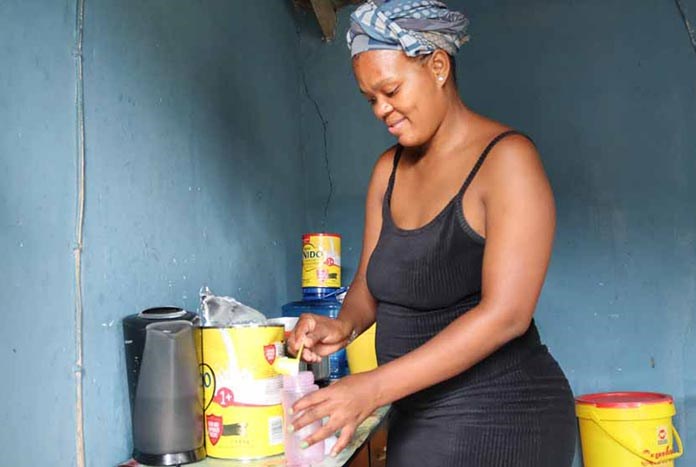
A place to call home: Young women in the Independent Living Programme have a safe place to live and raise their children
— — — — — — —
For young women, one of the most significant difficulties has been how hard it is to reintegrate them back into their homes. Particularly if they are returning home now with a child, of if returning to home means they will be living with someone who has abused them.
“It’s better to be abused by someone you don’t know, rather than someone you do”, was one of the heartbreaking responses from a young women uMthombo was supporting when she described why she had come to the streets. Unfortunately, for these reasons, and the fact that young women are often blamed for being on the streets, the reintegration either breaks down quickly or has little chance of success.
uMthombo has therefore developed a different path for young women to develop away from the streets, which offers them a way to live independently instead of reintegrating back home. The uMThombo team meets weekly in a park beside one of the largest abandoned buildings in downtown Durban, where many of the young mothers and children are living. These weekly relationship-building meetings help the young women identify and work through the steps necessary to move on into supported independent living. Once away from the streets, they will be further supported in one-to-one and group work settings where they are encouraged to share their experiences and trauma. This is a vital part of the process towards independence and being able to look to the future and begin training on how to gain employment.
“It’s better to be abused by someone you don’t know, rather than someone you do”
It can take up to three years from when uMthombo's outreach team first meets a young woman to her moving into independent living. There will have been many setbacks and challenges to overcome, particularly when navigating abusive or controlling boyfriends/pimps. But combining their regular outreach work on the streets with their one-to-one psychosocial support, residential camps for young mothers, (and in 2020, provision of essentials including food and sanitary supplies), creates a package of support and accompaniment that leads to the point when girls are able to leave street life.
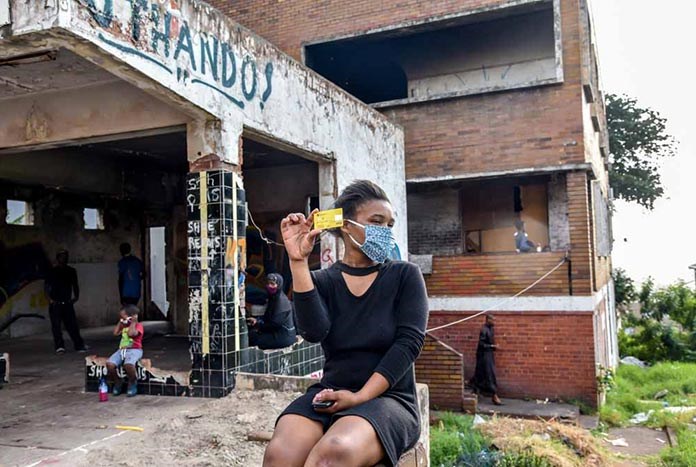
Accessing their rights: uMthombo help young women to access child support grants and other entitlements, and to set up their own bank accounts so they can earn and save
— — — — — — —
There are no quick fixes to transforming girls’ and young women’s lives. The girls who started the process of moving away from the streets in 2021 were fearful of change, trapped in controlling relationships and unable to imagine a different future yet. Mpendulo, uMthombo’s director, reflected on the girls they have helped, “they acknowledge the change and love the life they have found. But still, there’s a residue of that old life.”
It is hard for some young women to leave street life behind, even with the help of uMthombo social workers, as they may have lived on the streets for 5-10 years. In addition, some are still struggling to exit previous controlling or abusive relationships.
So all positive steps are celebrated, such as finding a job in the local area to help pay rent and support their child, applying for their child’s birth certificate or signing up for the family support grant to supplement their income.
It can take up to three years from when the uMthombo outreach team first meets a young woman to her moving into independent living.
Now that they are settled, some of the young women plan to join the ‘learnership’ (work training) programme that uMthombo runs, giving them paid work placements across the city in different city departments and local businesses. In addition, two young women (both mothers) with hairdressing skills are being supported by uMthombo to set up a small salon. Two further young women are being supported with equipment to start a small catering business in the community.
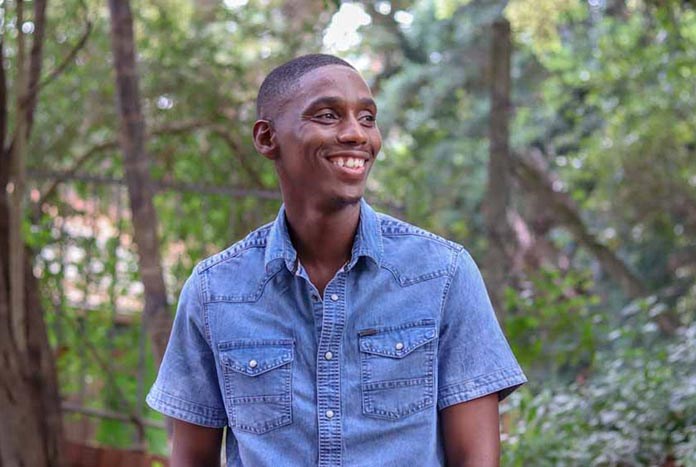
uMthombo’s team: Lindo, uMthombo’s lead social worker, manages the dedicated team who work daily with young men and women on the streets
— — — — — — —
The Programme leads to some unexpected additional outcomes too. For example, although created to help young women who couldn’t return home safely, there is a story that’s taking a different turn for one young woman.
Amahle*, 18, is the youngest woman in uMthombo’s independent living programme. She came to the streets from the Eastern Cape, where she had run away from home whilst pregnant. Her family had told her they wouldn’t be taking care of her and a baby and that she had to go and find a job. So Amahle came to Durban, first living on the streets and ending up in one of the abandoned buildings.
The people who ‘helped her’ when she arrived on the streets were involved in sex work and tried to get her into the trade. She tried for a while but soon met with uMthombo and got to know their girls’ outreach worker, Hloniphile. She shared that the others were trying to pull her into sex work, and it wasn’t what she wanted for her life. So after becoming part of the independent living programme and getting ready to move away from the streets, Amahle now rents her own place in a Durban township with her 6-month-old baby.
Once she moved away from the street, Amahle asked uMthombo’s social workers to help her reconnect with her family, to go to her grandma and speak with her about her situation and her wish to rebuild the relationship. uMthombo has been working with her family, ensuring that home is a conducive environment for her to return to. Now she has lived four months away from the street, Amahle is preparing to go home to her own community. (*Name changed for anonymity).
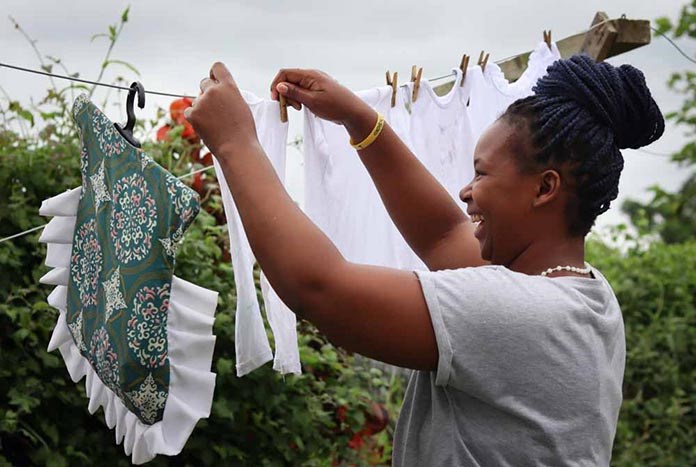
Joy in small things: The road ahead may still be long but having a place to call home away from the street is a first step for these young women as they make choices to shape their own futures
— — — — — — —
uMthombo realises how their independent living programme is not only a long-term solution for young women who can’t go home but may also form a stepping stone for some young women like Amahle, to reflect and reconnect with their families and community.
So after becoming part of the independent living programme and getting ready to move away from the streets, Amahle now rents her own place in a Durban township with her 6-month-old baby.
Twenty-three young women living on the streets or in abandoned buildings regularly attend sessions with uMthombo’s outreach team. Eight are young mothers, with twelve babies between them. Eighteen of these young women have been identified as potential candidates for the independent living programme, with twelve taking the first steps towards a different future.
Flooding in KwaZulu Natal
In April and May 2022, KwaZulu Natal was hit by the worst flooding it had experienced in decades. 13,500 households were affected by the floods, 1000 individuals were displaced, and 18 bridges were damaged. Around 443 people were reported dead, with 63 missing. There are many undocumented migrants in Durban, so the death toll could be much higher.
The area where the young women in the independent living programme live was severely affected; thankfully, their homes were safe, although they experienced a lack of fresh water, electricity cuts and local roads were washed away.
During the pandemic, uMthombo had worked very closely with the provincial government department — COGTA (Cooperative Governance and Traditional Affairs), to deliver essential supplies to young people and families in Durban’s surrounding communities who had no access to food or water. When the floods hit, uMthombo assisted affected families and individuals with relief packages, similar to how they helped during COVID and those affected by the looting in 2021.
In April and May 2022, KwaZulu Natal was hit by the worst flooding it had experienced in decades. 13,500 households were affected by the floods, 1000 individuals were displaced, and 18 bridges were damaged.
These families are from the areas where most children come onto the streets; this forms part of uMthombo’s preventative work. uMthombo is also identifying children at risk through early childhood care centres. They are currently working with four centres to provide nutrition for 217 children. They visit the childcare centres once a month, and then cases are referred for ongoing support, especially those children of young mothers with a severe lack of support.
uMthombo’s work has shifted over the years to respond to the changing needs of the young people coming onto the street and what ‘street-connectedness’ means in the city of Durban. Over the last two years, the pandemic and flooding have been devastating.
Still, they have also provided uMthombo’s team with opportunities to build more trust with street-connected young people as they continue to show up each week to support them. Progress can feel slow, and there are often setbacks, but their results are long-lasting.
— — — — — — —
To find out more about uMthombo and to make a donation to their work, please visit amostrust.org/umthombo.
— — — — — — —
A Little More...
More First Of The Month
Older editions of our First Of The Month essays are available to read and download here.
Words Of Hope E-news
Sign up to receive our regular ‘Words Of Hope’ emails and keep up to date with all the latest Amos news and information, including details of our trips and events, news from our partners around the world and all of our campaigns.
Online reflection
Join us every Tuesday at 5pm for ‘Words Of Hope’ — our online reflection. Simply click here to join us a few minutes beforehand.
Amos Trust
7 Bell Yard, London
United Kingdom
WC2A 2JR
Telephone:
+44 (0) 203 725 3493
Email:
[email protected]
Registered Charity No.
1164234

This item has been added to your shopping basket. Please click on the Checkout button below where you can choose your quantity.
Continue shopping Checkout Close